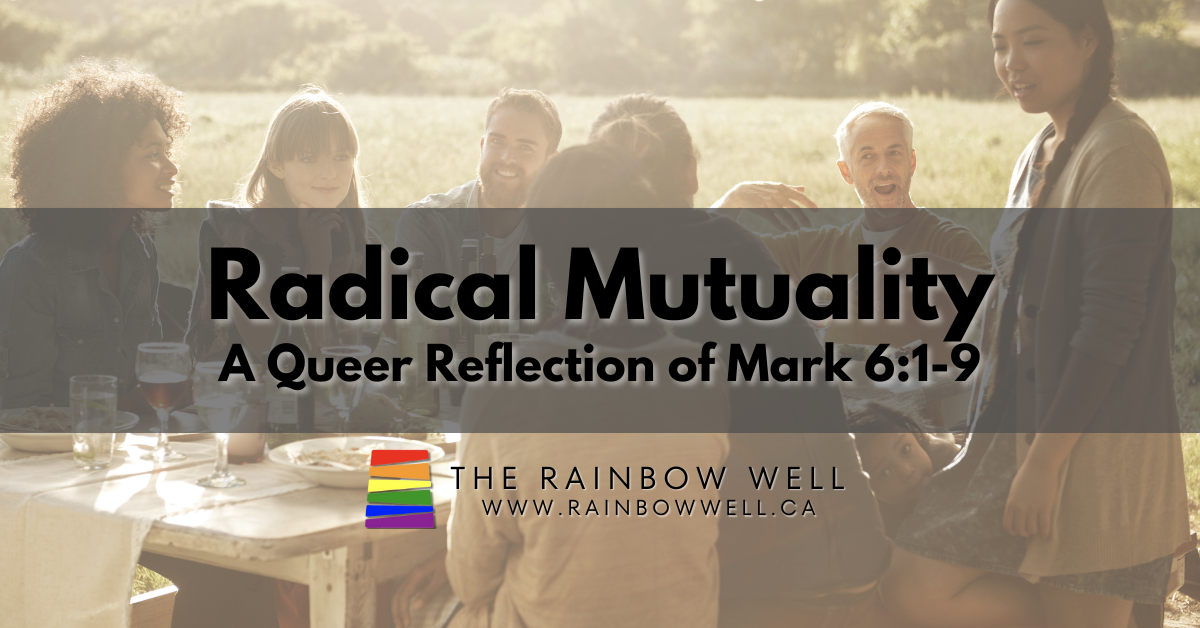Radical Mutuality: A Queer Reflection On Mark 6:1-9

by Jamie Arpin-Ricci
Like so many other queer folks, some of the most difficult aspects of being a bisexual man (especially in Christian contexts) have been the intense resistance I have experienced about that aspect of my identity. More often than not, I was forced to choose between either being a Christian or being queer. It was made clear that I could not be both. That choice was underlined by the often explicit threat that making the wrong choice would result in my exclusion from the very community I had invested my entire life in. And that is saying nothing of the threats of exclusion from eternal life with God.
And yet, not only is my queerness a reflection of the divine image in which I was created, but my experiences as a queer man deeply inform my faith and lived devotion to God. It has been out of my response to resistance and rejection that I have encountered the most beautiful and powerful experiences of faith. Like many others, I have been faced with the question: How do I reconcile that fact that the thing that has produced my most authentic experiences of faith is the very thing that resulted in my rejection by so many Christians?
Jesus was no stranger to such experiences. In the Gospel reading, we see Jesus returning to his hometown only to be met with rejection. People knew him only as a humble carpenter (and one of uncertain birth), so accepting him as a prophet of God was a stretch for them. The people who Jesus grew up knowing- people who should have found pride in his sacred vocation- could not look past their own assumptions and prejudices.
How many queer Christians have faced the same sense of rejection? We have come to see the beauty and intentionality of our queer identities, longing to share that life-giving beauty with the church. Yet, suspicion, fear, and rejection are all too often the responses we receive. When have you faced rejection from those closest to you in this way? How have you navigated the tension, and what have you learned about yourself and your community in the process?
I take comfort in seeing that Jesus faced this kind of rejection- not that it eliminates the harm we experience in these situations, but because it gives me hope. Like Jesus, I have found a truer community- a chosen family of love and faith that celebrates the fullness of who I am because they see in me- that we see in each other- the beauty of the divine.
The story goes on with Jesus sending out his disciples with a few provisions, emphasizing the practice of relying on the hospitality of others. Now, this lesson cannot be separated from the cultural practices of the time, where offering hospitality to a guest was deeply rooted in faith and culture. I don’t think this text advocates for us to show up at people’s doors today and expect to be welcomed, fed, and housed without question. So what is the takeaway here?
Jesus was emphasizing that despite the rejection that he faced in his hometown- and the rejection he knew his followers would face- he believed in the power of mutuality. He was not sending out his disciples as triumphalistic bearers of truth, but humble servants who had as much to receive as they had to give. This shift in posture- this radical mutuality- worked against the prevailing hierarchy of religious and political leaders, leaning instead into a divine kinship that offered mutual transformation.
While far from perfect, my own experience in the queer community often reflects this sense of kinship. Again, given our experience of rejection and exclusion, the formation of chosen families and the practices of mutual aid are very common for us. Queer theology celebrates the beauty and necessity of these support systems because our survival and flourishing have so often depended on the love and solidarity we find in our chosen families. Thus, as queer Christians, we can offer powerful insights and practices that the church could benefit from as they seek to embrace the teachings and example of Jesus in this respect.
As we reflect on this Gospel text from a queer perspective, I hope that we can all envision and therefore seek to cultivate community where this radical mutuality and transformation become the norm. Far from being hindrances to our faith, our queer identities and experiences enrich our walk with Jesus and offer priceless wisdom for the wider church
How then can we, as queer Christians, embody these principles more fully? How can those committed to allyship begin to embrace such practices? As you go into this week, may these reflections bring you hope, joy, and fullness of life.

